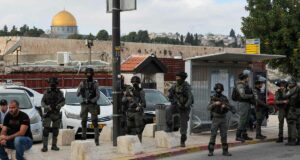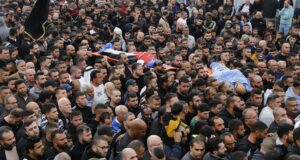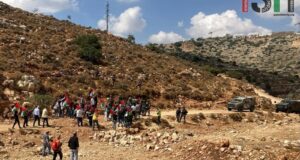By Kobi Snitz
Originally published in Zmag
Last afternoon, the Israeli army invaded the village of Budrus during the course of a wedding at which most of the village was present. Many shots were fired, three injuries were suffered and one youth was arrested. Concerned for their friend, a group of people left the village and followed the jeep which took him away. When they were unable to retrieve their friend, the people took out their frustration on the fence which comprises part of the Israeli separation barrier. As a result, about 150 meters of the fence were dismantled and two victory parades were held in the village on the following days. Confidant that world is watching, the villagers addressed themselves to it: “no to the wall” in Hebrew, their trademark “Budrus, we can do it” in English, and in Arabic, they praised the strength of god: “Allah hu akbar” but also sang about their own strength.
This is not the first time that parts of the fence are dismantled. On several occasions, Palestinians supported by Israeli anarchists and by international activists managed to dismantle parts of the fence in meticulously planned actions. However, this time it was different, the young people of Budrus did not wait for Israeli or international activist support or even for the village elders to plan or approve the action. Furthermore, the amount of fencing dismantled goes beyond the symbolic level which often passes for direct action.
Spontaneous action, by which people directly dismantle the structures which oppress them, is often the stuff of songs. Most of the time though, the singing is done at a safe distance from political relevance. For example, American media has romanticized the struggle against legally sanctioned segregation to the point that the singing of its movement songs has become a “hallmark moment”. At the same time, current, relevant struggles are either ignored or demonized. It is probably the case that the words “Palestinian civil rights movement” or “Palestinian non violent demonstration” were never combined on American mainstream media.
Much has been written about the popular resistance to the Israeli separation barrier and about Budrus in particular. Over the last year Budrus has become the most successful example of Palestinian popular resistance, leading some to talk of a renaissance in the popular struggle, reminiscent of the first Intifada. For several reasons, the current demonstrations cannot match the incredible levels of participation in the first Intifada but the current popular intifada has seen important advances. First of all, in several cases concrete gains can be attributed to the resistance and secondly, international and Israeli activists have finally joined Palestinian demonstrations. Indeed those visitors who are able to see the Budrus struggle for what it is, felt lucky to be there to see the people of Budrus tear down the wall. For the few Israelis activists present, it felt like their private version of 1989 at the Brandenburg gate. Back in Tel-Aviv however, it seemed that the celebration will remain a private one. The military censors forbade the Israeli media from mentioning that the fence was dismantled, one mention slipped by in the Saturday evening news and the indymedia carried pictures and reports.
Several months ago, army commanders had informed the village that no more demonstrations would be permitted. In order to make this point the village was essentially put under curfew for two weeks. The people of Budrus are very familiar with the toll that the army can extract, in the course of over 50 demonstrations 212 people were injured from rubber bullets alone in a village of 2000 inhabitants. The number of people hurt from tear gas inhalation is too large to keep track of and last year a, 17 year old, Hussein Mahmoud Hussein Aweideh from Budrus, was shot dead at a demonstration in Beitunia. It is expected that the army will want to retaliate against the village for the latest action with more invasions and perhaps more administrative detentions of village leaders. Another possibility, the one that the Israeli censors must be afraid of is that Budrus will in fact turn out to be Palestine’s Brandenburg gate, the place where the wall began to fall.
 International Solidarity Movement Nonviolence. Justice. Freedom.
International Solidarity Movement Nonviolence. Justice. Freedom.


